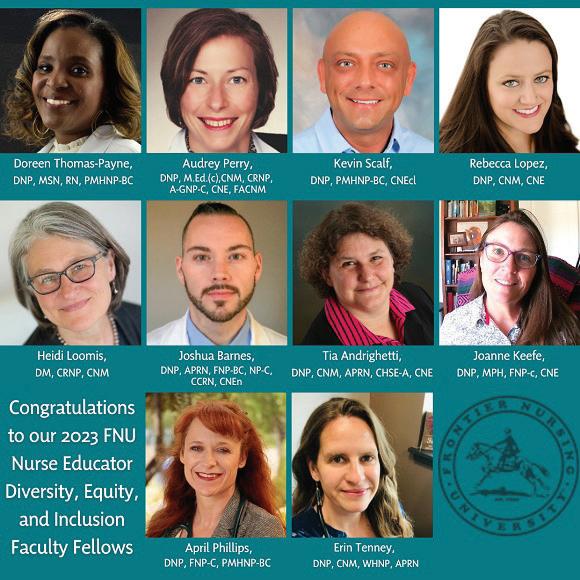
3 minute read
FNU Introduces Nurse Educator Diversity, Equity, and Inclusion Faculty Fellowship Program
In the summer of 2022, FNU announced plans to develop a Nurse Educator Diversity, Equity, and Inclusion (DEI) Fellowship program. In January 2023, ten FNU faculty members were selected as the program’s inaugural class. Through this initiative, which is fully funded by FNU, the faculty members attend a 12-week DEI training. This program rejects the traditional DEI approach and uses an individualized peer education model to facilitate faculty development of knowledge and skills to engage in anti-racism education. Upon completion of the program, each fellow will then be assigned to coach other members of the FNU faculty for 12 weeks. This was a competitive process, and the application was open to all faculty at FNU. The 10 Nurse Educator Faculty Fellows are Drs. Tia Andrighetti, Joshua Barnes, Joanne Keefe, Heidi Loomis, Rebecca Lopez, Doreen Thomas-Payne, Audrey Perry, April Phillips, Kevin Scalf, and Erin Tenney.
“This initiative came out of the President’s DEI Task Force,” said FNU Chief Diversity and Inclusion Officer Dr. Paula Alexander-Delpech, Ph.D., PMHNP-BC, APRN. “I am so proud that the university has invested in this important development and training for our faculty, who can then lead and learn from one another.”
Advertisement
One of the aims of the program is to develop an innovative approach to increase health equity through faculty development strategies. As a university, FNU strives to create an anti-racist culture and environment. FNU will replicate the DEI Faculty Fellow program for a Staff DEI Ambassador Program, which will be open to all staff, including supervisors.
As part of the application process, each faculty member was required to submit a letter of support from their respective department chair. Additionally, each applicant had to develop an essay that illustrated why they wanted to become part of this DEI initiative.
“It’s so important to know our ‘why.’ The ‘why’ drives our actions and governs our ambitions. Our ‘why’ reflects our personal mission,” said DEI Faculty Fellow Dr. Kevin Scalf, DNP, PMHNP-BC, CNEcl. “I want to be a better ally. I acknowledge that I have a lot to learn in this process, but I want to play an active part in creating and fostering our mission of becoming an anti-racist university. I want to help promote equity for all.”
“Everyone has different lived experiences and offers valuable perspective and insight,” Scalf said. “When we value, appreciate, and celebrate our unique experiences and perspectives, our lives are enriched. There is no limit to what we can do if we work to value, understand, and respect each other. We want to create a culture of respect and belonging here at FNU while preparing the APRN student to go forth and effectively deliver culturally appropriate healthcare.”
The fellows will also have the opportunity to plan and implement a capstone project related to the DEI initiative. This capstone project will allow them to integrate the DEI initiative into regular activity at FNU.
“My experience as a DEI Faculty Fellow has been wonderful! I have not only gained essential knowledge of DEI concepts but have also been able to more effectively evaluate my own personal biases and consider the impact of implicit bias on individuals, families, and community. I feel so privileged to belong to a group that values diversity, equity, and inclusion. I always look forward to our weekly meetings.”
In addition to meeting weekly as a group to learn more about essential DEI concepts, they also have had the opportunity to participate in weekly training sessions that increase their ability to hold brave conversations.
The group meets weekly with Dr. Alexander-Delpech. During these meetings, the faculty fellows learn about important and relevant DEI topics and concepts and host a discussion with each other. As a national and university leader, Dr. AlexanderDelpech presented “The Development of A Faculty DEI Fellows Program” at the American Association of Colleges of Nursing’s Diversity Leadership Institute in June 2022.
“Even though we sometimes engage in difficult conversations, the sense of support from my colleagues is very strong, one might even say tangible,” Scalf said. “We recognize our diversity, place value on our unique characteristics, and actively work to learn more about the lived experience of other members. This is such an important part of our mission. Having and encouraging brave conversations is a very empowering experience. In fact, that is an overarching mission of the group; to help empower individuals. Everyone benefits when a community places value on diversity, equity, and inclusion.”








